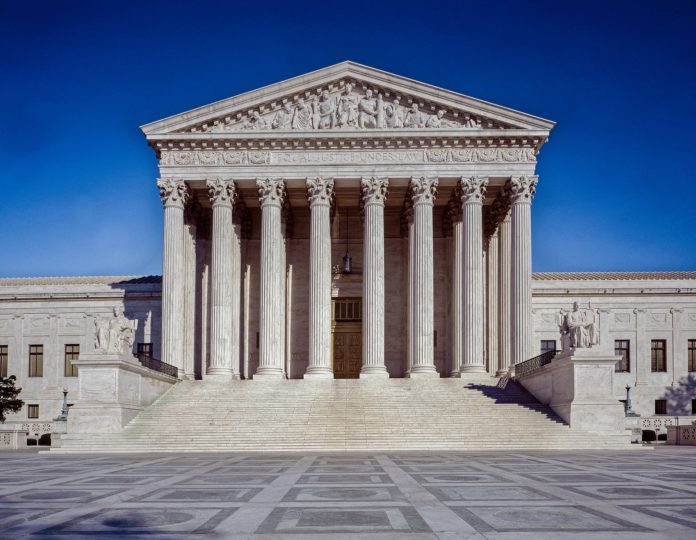
The U.S. Supreme Court upheld the Indian Child Welfare Act June 15, with the 7-2 court ruling the 1978 federal law doesn’t overstep Congressional power or illegally commandeer state resources.
The June 15 ruling came after the Supreme Court granted review to a case out of the Fifth Circuit Court of Appeals that argued ICWA’s placement preferences violate the equal protection clause and the law exceeded Congress’ power over state governments.
Earlier this year, Colorado lawmakers introduced a state version of ICWA that was signed into law May 4. One of the bill’s primary sponsors, Democratic Sen. Jessie Danielson, told Law Week around the time of introduction that the legislation was written in case the U.S. Supreme Court overturned ICWA.
ICWA was passed by Congress in 1978 in response to reports that children with Native American ancestry were disproportionately removed from their families by state agencies compared to children of other races. The studies also found around 85% of Native American children were placed in homes with families that weren’t Native American.
Under ICWA, state agencies that are removing and finding new homes for children who are federally recognized tribe members or the biological child of a tribe member eligible for membership, must take additional steps in the proceedings. That includes involving tribal leadership in the process and prioritizing placement of the child first with their own family, then with a family that is a member of the same tribe, then a family that is a member of a different tribe followed by a family without tribal connections.
The states of Texas, Louisiana and Indiana and seven individuals sued leadership at the U.S. Department of the Interior, the Bureau of Indian Affairs and the U.S. Department of Health and Human Services in October 2017. The lawsuit claimed ICWA broke the Fifth Amendment’s due process and equal protection provisions, the 10th Amendment’s anti-commandeering provision and the Administrative Procedure Act.
While a district court ruled in favor of the states and individuals, an en banc panel of the Fifth Circuit Court of Appeals reversed some of the district court’s findings around the lawsuit’s merits (finding ICWA didn’t exceed Congress’ legislative power, didn’t break the nondelegation doctrine and some placement preferences satisfy the equal protection provision), but upheld the lower court’s findings that some of ICWA’s requirements for state agencies unconstitutionally commandeer the states. The full court was equally split on a number of other issues, including if ICWA’s placement preferences discriminate against non-Native American families, which left the district court’s findings in place.
On appeal to the U.S. Supreme Court, the case asked the court to review the Fifth Circuit and district court’s findings.
The Supreme Court’s majority opinion written by Justice Amy Coney Barrett joined by Chief Justice John Roberts, Justices Sonia Sotomayor, Elena Kagan, Neil Gorsuch, Brett Kavanaugh and Ketanji Brown Jackson explained ICWA doesn’t violate Congressional power or the anti-commandeering doctrine. The majority didn’t address the equal protection arguments or a nondelegation argument, finding none of the parties had standing to bring them.
Barrett wrote that while states traditionally have authority over family law matters, in matters regarding Native American tribes, Congress’ power to pass laws supersedes state and tribal powers, meaning ICWA does not overstep Congress’ power.
The majority also rejected the argument that ICWA’s additional requirements for state investigators commandeer state resources. The court held requirements that agencies perform a “diligent search” for family placements in-line with ICWA’s hierarchy and that a party that initiates removal make “active efforts” to keep a Native American family together apply equally to state governments, the federal government and private parties even if state agencies initiate the majority of removals. “Legislation that applies ‘evenhandedly’ to state and private actors does not typically implicate the Tenth Amendment,” wrote Barrett.
The court further found ICWA’s requirements for state courts to keep and send records around removal of Native American children didn’t break the anti-commandeering doctrine since it impacts state judicial branches, not legislative or executive branches. “The duties ICWA imposes are ‘ancillary’ to the state court’s obligation to conduct child custody proceedings in compliance with ICWA,” Barrett wrote.
The court’s two dissenting justices wrote separate dissents.
Justice Clarence Thomas wrote that ICWA’s regulation of family law in state courts “should raise alarm bells,” and criticized the majority’s holding that Congress had the power to pass the law.
In his dissent, Justice Samuel Alito argued the majority’s holding disregarded the best interests of children and could create cases where children are placed in living situations that are worse because of the hierarchy.
“Whatever authority Congress possesses in the area of Indian affairs, it does not have the power to sacrifice the best interests of vulnerable children to promote the interests of tribes in maintaining membership,” wrote Alito.
Gorsuch wrote a separate concurrence, joined in part by Sotomayor and Jackson, to express his support of the majority’s decision and to provide historical context around ICWA.
Kavanaugh also penned a brief concurrence, writing that while he agreed the parties didn’t have standing to bring their equal protection arguments, he was concerned ICWA might discriminate against children on the basis of race and would be open to hearing those arguments in the future.

